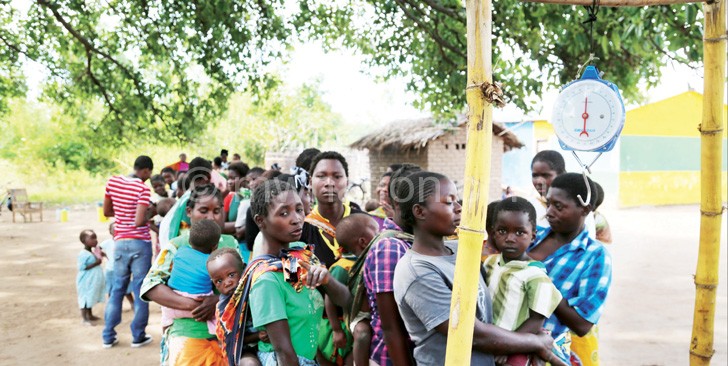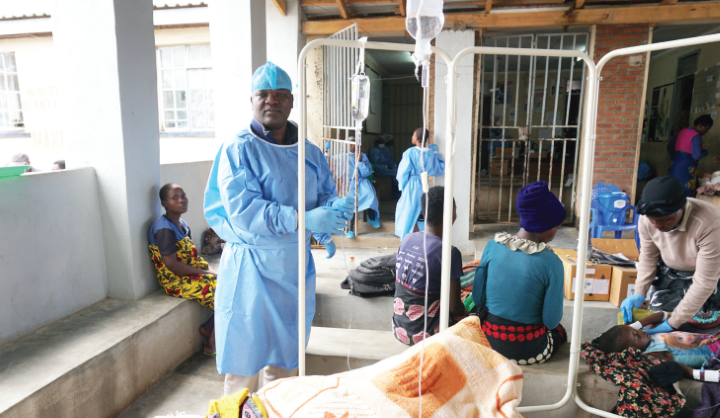No clinic, more girls at risk
Rural clinics, constructed by Red Cross, are lessening untold hardships of girls, mothers and children. JAMES CHAVULA writes.
Edna, 16, could have gone unnoticed if she had not been breastfeeding in public. So rampant are teen mothers in her setting that she rues attaining sexually active age before a clinic took shape in the countryside.

Last year, the girl in Humbo Village south of Karonga quit school to give birth and now struggles to raise the baby boy singlehandedly as the father reportedly fled to South Africa in search of better economic opportunities than “just growing cassava”.
During the meeting, she was perching under a mango tree alongside women who had queued to weigh babies, undergo HIV testing and counselling and obtain contraceptives.
She regrets being in the line, saying: “I sold my entire life in the name of love.
“I wish there was a way to prevent unwanted pregnancy and sexually transmitted infections, but it is unimaginable for a girl to ask for condoms with all these relatives, neighbours, peers and children gazing.”
Premarital sex remains a taboo in the country and Edna believes murmurs of her flirtations with condoms would have reached her parents before she got what she wanted.
Unfortunately, she is not alone in this exclusion. The United Nations estimates that for every Malawian girl is another who married before her 18th birthday.
At Humbo, the teen mothers account for nearly seven in every 10 people queuing for maternal and childcare services.
Lately, Malawi Red Cross Society has constructed a clinic complete with a health surveillance assistant’s house, one of the four health facilities credited with improving delivery of basic health services in remote parts of Senior Chief Wasambo.
Red Cross project manager Gloria Kunyenga says the clinic comes in fulfilment of the humanitarian society’s mission to reduce the suffering of people in difficult situations.
Red Cross exists to reduce the hardship of humankind regardless of where they are. We decided to intervene to close the gaps in access to healthcare services that the villagers have been facing for years, especially in the rainy season,” Kunyenga said.
The villagers, who contributed sand, bricks and other building materials, salute the quasi-governmental organisation for the beginning of the end of time-honoured uncertainties resulting from shortage of clinics and health workforce in remote areas. They no longer demand condoms, pills and other contraceptives as children and passersby looked on.
“For years, we have been crying for a safe space where we can get sexual and reproductive health services without fear of intruders plying on us. At last, we have what we wanted,” Abigail Phiri said.
The ended lack of privacy sometimes pushed women, especially those who adopted birth control without their partners’ consent, to shun the contraceptives, Phiri recalled.
“It’s no surprise many couples have more children than they can properly raise,” she indicated.
The far-flung community praises the shelter for lessening their hardship, especially in times of rains when the open-air health outreach were either being postponed or disrupted.
Anganile Mwanyongo, one of three health surveillance assistants from St Anne’s Hospital who used to visit Humbo once a month, no longer travels up to 13km to deliver family planning, HTC, prenatal and postnatal services.
Her counterpart William Msiska now resides on the site of the newly constructed clinic where she used to see over 100 women, including 15 pregnancies and five children, every third Thursday of a month. Every week, Msiska sees tens of clients vying for maternal services, contraceptives, inoculation and other child-centred interventions.
“It was pathetic seeing women from afar going back unserved because of rains,” Mwanyongo recalled.
The community health workers recalled postponing and cutting short the monthly outings due to harsh weather.
However, they rate the lack of a safe space as the main reason many wind up with unwanted babies.
The fear of onlookers is written all over her records which show the majority of the women demand injectable contraceptives instead of pills, condoms and diplovera.
“Injections are good for those likely to be subjected to ill-treatment by partners opposed to contraceptives,” Mwanyongo said, adding: “You only need one injection every three months and nobody can tell you are on contraceptives.”
Some women confessed suffering beatings, separation and accusations of promiscuity when caught using pills and Norplant or talking about condoms.
This climate of fear pushes women to shun long-term methods, including the biceps-based Norplant whose efficacy lasts up to five years.
It also scares them away from condoms which prevent not only unwanted pregnancies, but also sexually transmitted infections.
Mwanyongo pointed to a group of girls of school-going age, saying they are the silent victims of lack of safe spaces.
“If adults are afraid, what can the boys and girls do?” she asks.
It was discernible why girls are at a high risk of pregnancies, STIs, HIV and Aids and dropping out of school.
They do not have access to correct information and life-saving options when it comes to sexual and reproductive health.
Some pupils the size of the majority on the queue did not want to hear about condoms, saying they are meant for married adults.
It may be cultural for teenagers to think they are too young, but the girls carrying babies confirms just how sexually active they are.
Harmful cultural practices and high money circulation have left girls in Karonga at the risk of risky childbearing with some getting pregnant before their 12th birthday, says district youth officer Kondwani Newa.
HSA Mwanyongo, whose outreaches were being partly sponsored by Red Cross, said: “The tragedy is that the numbers of teen pregnancies are high, but not many come forward to seek information and birth control methods.”





